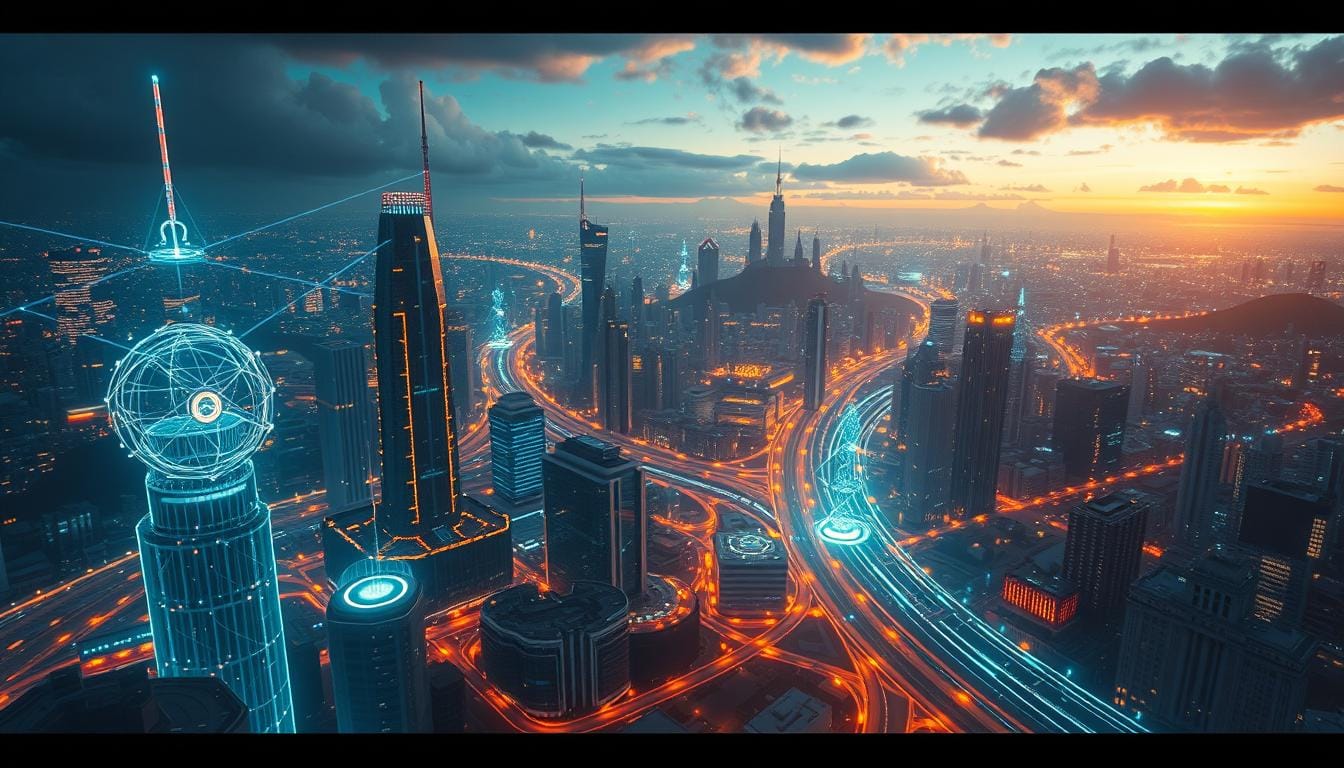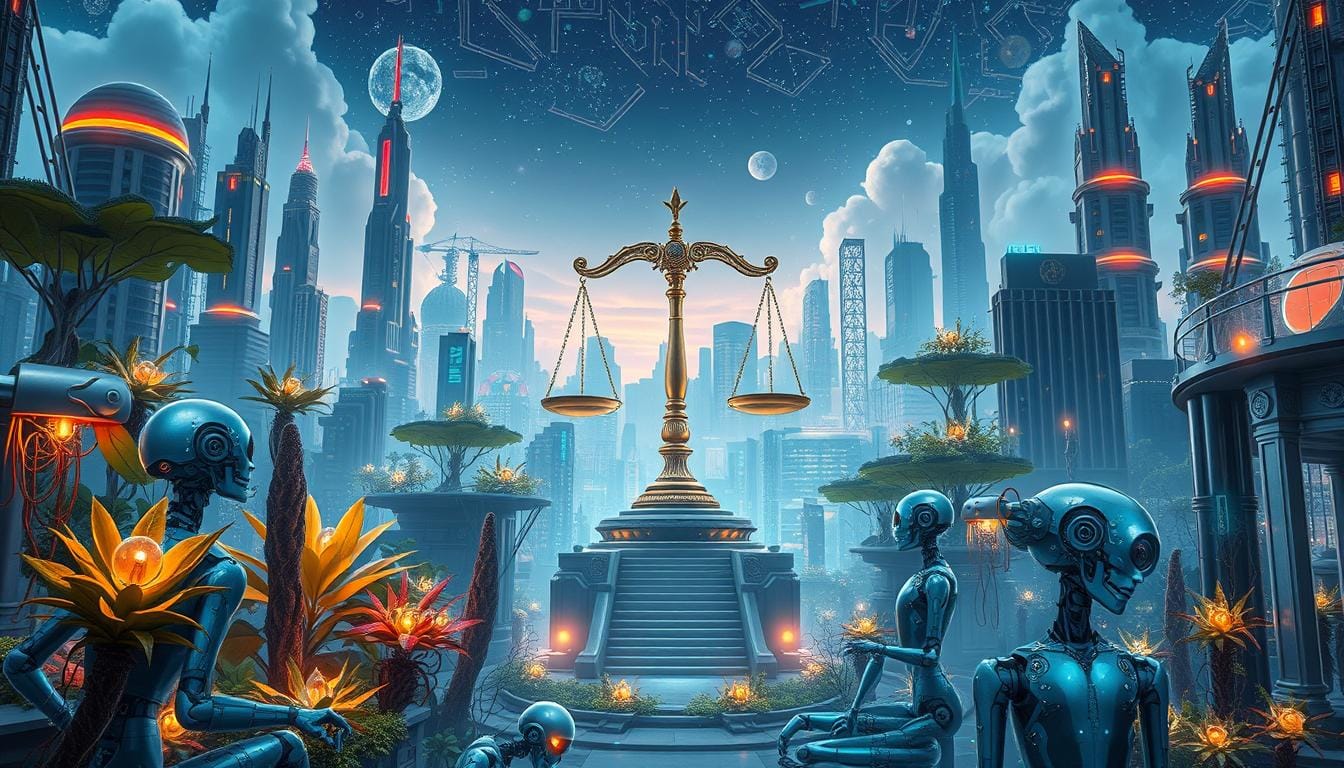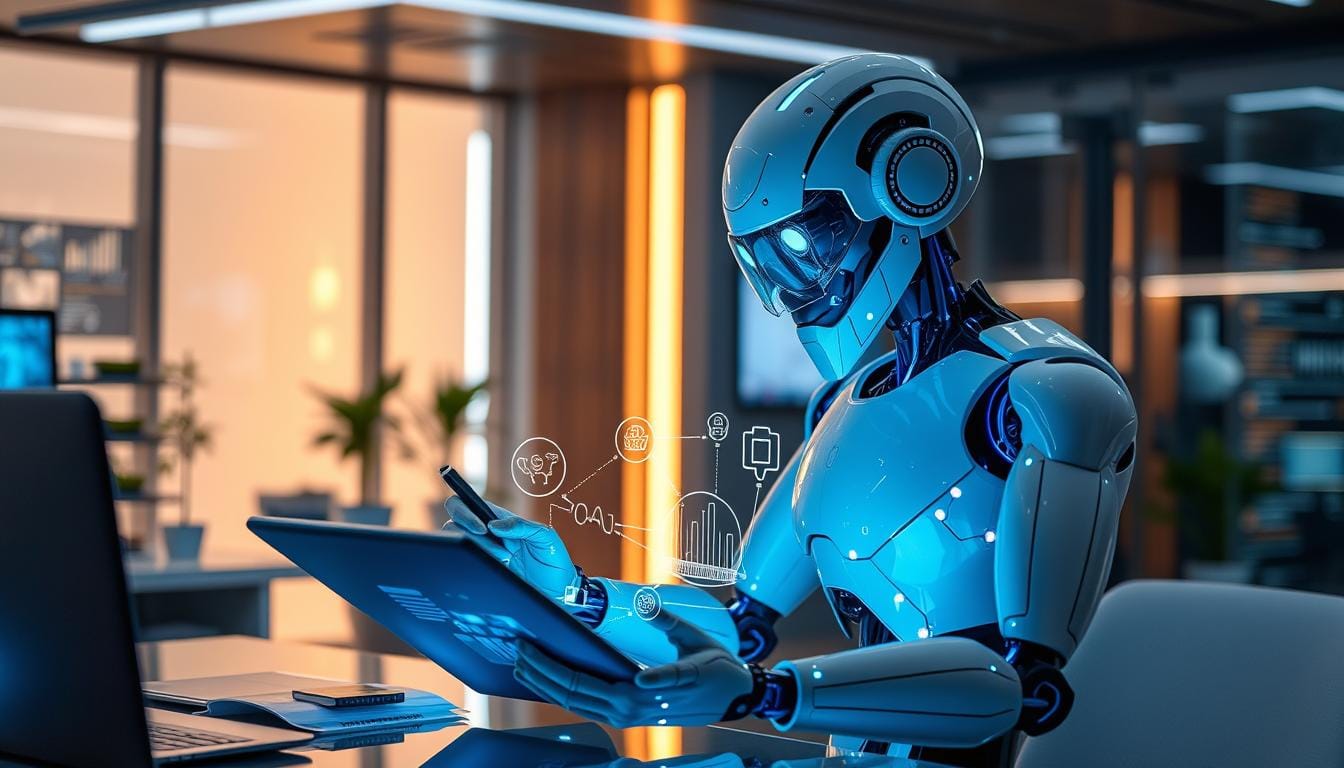We are on the edge of a new era, where artificial intelligence (AI) will change everything. It will bring new healthcare solutions and business ideas. As we move forward, we'll look at what's coming, the ethics, and how humans will interact with this technology.

Key Takeaways
- Explore the profound impact of AI on global industries and sectors
- Discover the latest breakthroughs in machine learning and deep learning
- Understand the transformative role of AI in healthcare, transforming patient care and outcomes
- Analyze the ethical and regulatory challenges surrounding the widespread adoption of AI
- Uncover the future of AI-human interaction and the evolution of the workforce
The Current State of Artificial Intelligence Technology
The world of artificial intelligence (AI) is changing fast. We're seeing big steps forward in many areas. AI is changing how we live and work, thanks to machine learning, deep learning, and natural language processing.
Machine Learning Breakthroughs
Machine learning is a key part of AI and has made huge strides. Computers can now learn from data and make smart choices on their own. Machine learning is used in image recognition, predicting what will happen next, and in self-driving cars. It's leading to new ideas in many fields.
Deep Learning Applications Today
Deep learning is a top AI area. It's based on how our brains work and can do amazing things like understand speech and see images. Deep learning is making things like personalized ads and self-driving cars possible. It's changing many areas of life.
Natural Language Processing Achievements
Natural language processing (NLP) has made big leaps. Now, computers can talk and understand us like never before. NLP helps with chatbots, translating languages, and figuring out how people feel. It's making talking to computers more natural and helpful.
Today's AI shows how powerful machine learning, deep learning, and natural language processing are. They're changing industries and making our lives better. As AI keeps getting smarter, we'll see even more amazing things in the future.
Transformative Impact of AI on Global Industries
The rise of artificial intelligence (AI) has brought a new era to many industries worldwide. It's changing how businesses work, from making things to managing money. AI is driving innovation and opening up new chances for growth.
In industrial automation, AI is making things better. It uses robots and smart learning to do tasks faster. This lets people do more important work. Also, AI-driven innovation is changing how we design and make products.
| Industry | AI-Driven Impact |
|---|---|
| Manufacturing | Improved quality control, predictive maintenance, and supply chain optimization |
| Finance | Automated trading, fraud detection, and personalized investment recommendations |
| Healthcare | Advances in medical imaging analysis, drug discovery, and patient care management |
| Agriculture | Precision farming, crop yield optimization, and smart irrigation systems |
As digital transformation changes the world, AI's role grows bigger. It automates tasks, improves decisions, and finds new insights. This helps businesses keep up with technology and stay competitive.
https://youtube.com/watch?v=970gRmLANJQ
"AI is not just a technology; it's a fundamental shift in the way we approach problem-solving, decision-making, and innovation across all sectors of the economy."
The impact of AI on industries is clear, offering big chances for growth and improvement. As AI keeps getting better, it will change how we live and work. We're entering a new era of progress and innovation.
The Future of AI: Key Predictions and Trends
The world is getting more digital, and AI is changing fast. Experts and fans are looking forward to AI's next steps. This section will look at some key predictions and trends that will change our world.
Short-term Developments (2024-2025)
Soon, AI will get better at understanding and talking like us. This will change how we interact with machines in fields like customer service and healthcare. Also, AI will make smart homes and cities possible with the help of 5G and edge computing.
Medium-term Evolution (2026-2030)
AI will soon make decisions on its own in many areas. This will make things like finance and supply chains more efficient. AI will also get better at being creative, changing entertainment and marketing.
Long-term Possibilities (Beyond 2030)
- Artificial General Intelligence (AGI) could make huge leaps in science and medicine.
- AI and quantum computing could solve complex problems faster than ever before.
- AI assistants and robots could change how we use technology, making it more personal.
The future of AI is both thrilling and challenging. It will bring many benefits but also raise big questions. We need to work together to make sure AI is used wisely and for the good of all.
AI in Healthcare: Revolutionary Changes Ahead
The healthcare world is on the verge of a big change, thanks to medical AI. This technology is making healthcare more efficient, accurate, and accessible. It's set to change how we approach health care for the better.
Personalized medicine is a key area where AI is making a big impact. It uses machine learning to create treatment plans based on a person's genes, medical history, and lifestyle. This approach leads to better health outcomes and fewer side effects.
AI is also changing how we diagnose diseases. It uses advanced algorithms to analyze medical images and patient data. This helps doctors spot diseases early and make better decisions.
"AI will be the most important general-purpose technology of our era. It has the potential to transform every industry, including healthcare, in ways we can scarcely imagine."
- Andrew Ng, Renowned AI Expert and Entrepreneur
AI is also making a big difference in finding new drugs. It can quickly go through large amounts of data to find promising drug candidates. This speeds up the drug discovery process, leading to more effective treatments.
As AI becomes more common in healthcare, we'll see big changes. We'll see more personalized care, better diagnostics, and more efficient health services. This will lead to better health outcomes for everyone.
Artificial Intelligence in Business and Commerce
AI technology is changing business and commerce in big ways. It helps with automated decisions, better customer service, and smarter supply chains. These changes make businesses more efficient and innovative.
Automated Decision Making
AI is changing how businesses make choices. It uses algorithms to quickly analyze data and make smart decisions. This helps companies save money and adapt to market changes faster.
Customer Service Evolution
AI has improved customer service a lot. Chatbots and virtual assistants can help customers 24/7. They answer questions and solve problems, making customers happier and more loyal.
Supply Chain Optimization
AI is also improving supply chains. It uses data to predict demand and manage inventory. This makes supply chains more efficient, reducing waste and improving customer satisfaction.
As businesses use more AI, the future looks bright. AI will help with better decision-making, customer service, and supply chain management. This technology will help companies grow and succeed in a changing world.
| AI-Driven Business Applications | Benefits |
|---|---|
| Automated Decision Making | Improved efficiency, cost savings, and agility in responding to market changes |
| Customer Service Evolution | Enhanced customer experience, increased brand loyalty, and more personalized support |
| Supply Chain Optimization | Streamlined logistics, reduced waste, and improved overall productivity |
"AI is not just a technology, but a fundamental shift in the way we approach business and commerce. By embracing AI-driven solutions, organizations can unlock unprecedented levels of efficiency, innovation, and customer satisfaction."
Ethics and Regulation of AI Technologies
AI technologies are growing fast, making it key to have strong ethics and rules. It's important to make sure AI helps everyone, not just a few. We must avoid harm and make sure it doesn't worsen unfairness.
At the heart of AI ethics are three main points: transparency, accountability, and fairness. AI systems need to explain how they make decisions. They also need to be answerable for their actions, with ways to fix problems.
- Transparency in AI systems: Ensuring AI algorithms and decision-making processes are open to public scrutiny and understanding.
- Accountability for AI-driven decisions: Establishing clear lines of responsibility and mechanisms for redress when AI systems cause harm.
- Fairness and non-discrimination: Mitigating the risk of AI perpetuating or amplifying biases and discrimination.
Rules for AI ethics and technology regulation are vital. Leaders and policymakers must work together. They need to create responsible AI and ethical frameworks that protect our rights and privacy. This will help AI be a positive force in our lives.
"The responsible development of AI is not just a technical challenge, but a moral imperative. We have a duty to ensure this powerful technology is harnessed in a way that benefits all of humanity."

As AI changes our world, keeping ethics and rules in check is crucial. By focusing on AI ethics and responsible AI, we can make the most of this technology. We can also protect our well-being and society's.
AI's Role in Environmental Sustainability
The world faces urgent challenges like climate change and environmental damage. Artificial intelligence (AI) plays a key role in finding sustainable solutions. AI helps in climate modeling, resource management, and using green technologies. It changes how we protect the environment and conserve natural resources.
Climate Change Modeling
AI is changing how we understand our planet's climate. It uses big data to find patterns and predict outcomes. This helps us make better decisions to fight climate change.
Resource Management Solutions
- AI helps manage resources like energy, water, and waste better. It makes these processes more efficient and green.
- AI's predictive power helps businesses and governments use resources wisely. This reduces waste and environmental harm.
Green Technology Integration
AI is key in making green technologies work better. This includes renewable energy, smart grids, and green transport. AI boosts these technologies' performance, helping us move towards a greener future.
| AI Application | Environmental Benefit |
|---|---|
| Climate change modeling | Improved prediction and mitigation of climate change impacts |
| Resource management solutions | Optimized resource allocation and utilization for greater sustainability |
| Green technology integration | Enhanced performance and efficiency of renewable energy systems and green infrastructure |
AI and sustainability are crucial for our planet's future. Using green AI and climate tech can protect the environment. This leads to a more sustainable world for us all.
The Evolution of AI-Human Interaction
The world of technology is changing fast, and how we interact with AI is no exception. AI assistants are getting smarter and more helpful. This opens up new possibilities in many fields.
AI-powered virtual assistants can now understand us better. They can guess what we need and give us exactly what we want. This makes our lives easier, helping us with everyday tasks and big decisions.
The future looks even brighter for human-AI teamwork. Advances in AI and machine learning will make AI work better with us. It will help us do more and work more efficiently.
| Aspect | Current State | Future Potential |
|---|---|---|
| AI Assistants | Mainly focused on task automation and information retrieval | Seamless integration with user workflows, proactive problem-solving, and personalized assistance |
| Human-AI Collaboration | Limited to specific, well-defined tasks | AI systems that can work alongside humans in complex, creative, and decision-making processes |
| User Experience | Improving but still with some friction and limitations | Highly intuitive, adaptive, and personalized interactions that enhance productivity and satisfaction |
As AI and humans work together more, we'll see big changes. AI will become a key partner in our daily lives. It will help us reach new heights by combining human smarts with AI power.

"The true measure of any society is how it treats its most vulnerable members."
AI Education and Workforce Development
As AI technologies keep getting better, we need to get our workforce and schools ready. The skills needed today are complex, mixing technical know-how, critical thinking, and being able to adapt. People must learn to work well with AI, using their unique human skills to innovate and grow.
Skills for the AI Era
In the future, skills like data analysis, machine learning, and natural language processing will be key. Also, solving problems, being creative, and good at communicating will be important. These skills will help people succeed in a world where AI is more common.
Educational System Transformation
Schools are stepping up, adding AI-focused classes and using new tech in the classroom. They're using personalized learning and virtual simulations to get students ready for AI. Teachers are also teaching the value of lifelong learning, helping people keep learning and adapting to new jobs.
Career Path Evolution
AI is changing many jobs, leading to new careers like AI ethicists and machine learning engineers. Old jobs are also changing because of automation. To keep up, workers need to keep learning and preparing for the jobs of the future, using AI to improve their skills.
FAQ
What is the current state of artificial intelligence technology?
Today, AI technology is making big strides. We see major progress in machine learning, deep learning, and natural language processing. These advancements are changing many industries and making our lives better.
How is AI revolutionizing global industries?
AI is changing the game in many sectors worldwide. It's boosting productivity, sparking innovation, and opening up new opportunities in fields like manufacturing, finance, agriculture, and energy.
What are the key predictions and trends for the future of AI?
Experts are excited about AI's future. In the short-term, we'll see more progress. In the medium-term, there could be big breakthroughs. And in the long-term, AI might change our world in amazing ways.
How is AI transforming the healthcare industry?
AI is set to transform healthcare in big ways. It's improving personalized medicine, helping with diagnostics, finding new drugs, and enhancing patient care. These changes could make healthcare more efficient, accurate, and accessible.
What are the business applications of AI?
AI is changing how businesses operate. It's helping with automated decisions, improving customer service, and streamlining supply chains. These AI solutions are making businesses more efficient and competitive.
What are the ethical considerations and regulatory frameworks for AI technologies?
It's important to have strong ethics and rules for AI. We need to ensure AI is developed and used responsibly. This includes making sure it's transparent, accountable, and has a positive impact on society.
How is AI contributing to environmental sustainability?
AI is helping with environmental issues like climate change and resource management. It's also supporting green technologies. These efforts aim to tackle big ecological problems.
How is the relationship between humans and AI evolving?
Our relationship with AI is changing. We're seeing more user-friendly AI assistants and better collaboration between humans and AI. These changes have big implications for society and the workplace.
What skills and educational transformations are needed for the AI era?
To thrive in an AI world, we need to focus on developing key skills. We must also update our education systems and adapt career paths to fit the AI era.

